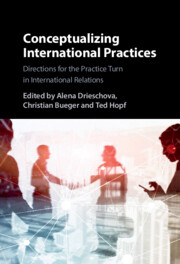Book contents
- Conceptualizing International Practices
- Conceptualizing International Practices
- Copyright page
- Contents
- Figures
- Table
- Contributors
- Acknowledgements
- Part I Introduction: Conversations and the Evolution of Practice Theorizing
- Part II Key Concepts of IR Scholarship
- Part III Innovative Concepts
- 9 The Dynamics of Repetition
- 10 Visibility
- Part IV Conclusion: The Future of Practice Theorizing
- References
- Index
9 - The Dynamics of Repetition
Translocal Practice and Transnational Negotiations
from Part III - Innovative Concepts
Published online by Cambridge University Press: 09 June 2022
- Conceptualizing International Practices
- Conceptualizing International Practices
- Copyright page
- Contents
- Figures
- Table
- Contributors
- Acknowledgements
- Part I Introduction: Conversations and the Evolution of Practice Theorizing
- Part II Key Concepts of IR Scholarship
- Part III Innovative Concepts
- 9 The Dynamics of Repetition
- 10 Visibility
- Part IV Conclusion: The Future of Practice Theorizing
- References
- Index
Summary
The chapter centres on the notion of repetition and takes it as the key concept of practice theory. It explores the translocal character of practice with regard to transnational diplomatic negotiations in the UNESCO World Heritage Programme. First, the chapter addresses a widespread bias towards stability and reproduction of the social in practice theory, points towards the need to take account of the dynamics of the social, and develops a poststructuralist understanding of repetition. The second part outlines three related dimensions of repetition and spells out their methodological implications for practice theory. By thinking of practices in terms of repetitions that link different sites and instances, the methodology of practice theory is to follow the fragile relations which make up the (in)stability of the social, enabling it to grasp the specific contributions of bodies and material artefacts. Drawing on data from a long-term participant observation, the final part of the chapter puts this methodology to work by analysing continuity and change in international diplomacy, looking at the interwoven diplomatic practices of negotiating, drafting, and decision-making.
- Type
- Chapter
- Information
- Conceptualizing International PracticesDirections for the Practice Turn in International Relations, pp. 193 - 212Publisher: Cambridge University PressPrint publication year: 2022

